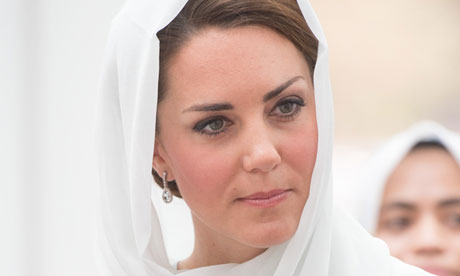This is clearly going to be a useful case study, with lots of interesting articles already published, and much more yet to come.
Tory Party Chairman Grant Shapps has praised the restraint of the UK press (which refused to carry the pictures published by French and Italian mags/papers and widely circulating online), and has gone so far as to say this will be taken into account when the gov't responds to Leveson in a few months time. That is being interpreted as the strongest signal yet that self-regulation, amazingly, will be given yet another 'final' chance, albeit beefed up with the power to levy fines very likely to be added.
Politically, that poses a problem for Labour - if they condemn this as a cynical ploy to win press support for the Conservatives, or seek to characterise it as the Tories cosying up to their big business/millionaire donors and supporters, then they risk being opposed by the entire press in the next election, and the run-up to it. As we've seen several times before, both major parties have backed off introducing fundamental reform of press regulation due to electoral calculations.
Richard Desmond is seeking to position himself as an unlikely gentleman press proprietor: he part-owns the Irish Daily Star which did publish the pics ... and
has threatened to close the paper as a result.
You can follow the developing story on this through several Guardian portals:
Privacy & the media
The Duchess of Cambridge
Richard Desmond
(plus Leveson, press regulation etc)
Here's one which might escape attention:
an opinion piece by columnist Catherine Bennett, who argues that the royal role is defined by invasion of privacy, and considers the Duchess a grossly objectified woman. She argues that the Uk press' condemnation of the French/Italian publication of the photos is hypocritical when the same grandstanding UK papers are forensically examining Kate's body for signs of pregnancy.
Here's another one flagging up the hypocrisy of the likes of Desmond: fulminating over these pics whilst continuing the page 3 tradition and publishing red-carpet 'wardrobe malfunctions'...
Topless Kate photos enrage UK papers, but don't change their behaviour
The
same titles that bemoan a French magazine for publishing long-lens
photos of the Duchess of Cambridge continue to print page 3 girls,
'babes' and red-carpet wardrobe malfunctions
 |
The Duchess of Cambridge: UK newspapers vocally support her right to privacy. Photograph: Tim Rooke/Rex Features
|
The British public is up in arms at a young woman's breasts being used to sell magazines. The Duchess of Cambridge's
boobs should not be gawped at, commentators point out. Her privacy has
been invaded in a shocking manner, everyone agrees. Even Richard Desmond
– the former publisher of Asian Babes – says he is so furious the Irish
Daily Star dared to use the photos he may shut his whole paper down.
So
does this mean breasts will no longer take centre stage in a certain
sort of newspaper, magazine or website? Well, not exactly. The UK Daily
Star today has a poignant headline about the royal scandal – "Kate's
smile hides the pain" – but still fills up page 3 with a picture of a
topless 22-year-old. Online it has a whole section devoted to boobs or,
at it calls it, babes.
The Sun, too, sees no hypocrisy in
supporting the duke and duchess's bid to sue the photographer
responsible for snapping Kate's chest in a Sun Says editorial – just a
couple of pages after printing a picture of Kelly, 22, from Daventry with her own breasts exposed.
Online the newspaper has a host of scantily clad women for readers to
pore over, such as Georgia Salpa in a bikini, Maria Fowler "flashing her
cleavage", and Kelly Brook posing for a new calender.
The People
may not be printing pictures of Kate but they see no reason not to use
photos of Helen Mirren, snapped by paparazzi on the beach in a bikini,
to illustrate a story about the actor getting a facelift. Their centre
spread feature is made up of images of former teenage sex worker Zahia
Dehar in see-through lingerie.
The Mirror's website implies it is
bored with printing pictures of Emma Watson's "sideboob" but does anyway
– just as they published images last week showing part of her nipple,
when her dress slipped. While on the front of their site they have a
naked Jenny Thompson (who once slept with Wayne Rooney) covering her
breasts and genitals with her hands.
The Daily Mail may be shocked
at the treatment of Kate but its notorious website sidebar is crammed
full of pictures drawing attention to celebrities' breasts – from Nicole
Richie in a cleavage-exposing dress, to Halle Berry in a bikini and
Amanda Bynes in a low cut top.
The message it seems, is clear –
it's fine to print pictures of half naked women, as long as they are not
heading for the throne.
...

 Getting to the (Rock) bottom of this, the performer's response to seeing what he asserts are made up quotes on the Daily Star's front page was not to contact IPSO ... but to release a short video rebuttal through his social media platforms (specifically a video on his Instagram).
Getting to the (Rock) bottom of this, the performer's response to seeing what he asserts are made up quotes on the Daily Star's front page was not to contact IPSO ... but to release a short video rebuttal through his social media platforms (specifically a video on his Instagram).


